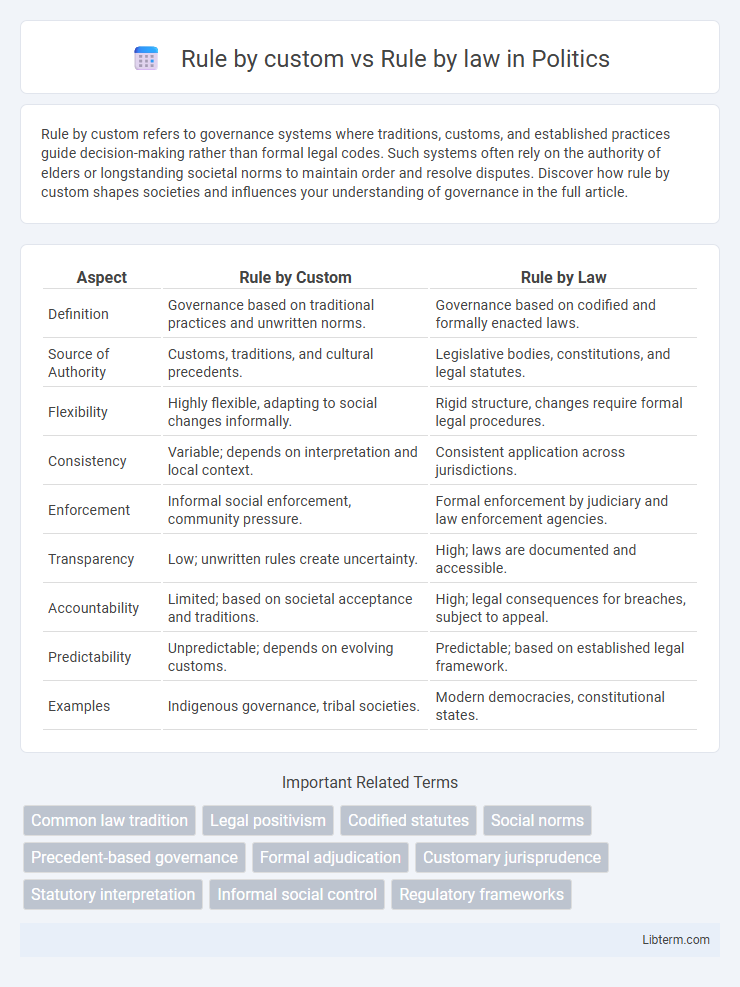Rule by custom refers to governance systems where traditions, customs, and established practices guide decision-making rather than formal legal codes. Such systems often rely on the authority of elders or longstanding societal norms to maintain order and resolve disputes. Discover how rule by custom shapes societies and influences your understanding of governance in the full article.
Table of Comparison
| Aspect | Rule by Custom | Rule by Law |
|---|---|---|
| Definition | Governance based on traditional practices and unwritten norms. | Governance based on codified and formally enacted laws. |
| Source of Authority | Customs, traditions, and cultural precedents. | Legislative bodies, constitutions, and legal statutes. |
| Flexibility | Highly flexible, adapting to social changes informally. | Rigid structure, changes require formal legal procedures. |
| Consistency | Variable; depends on interpretation and local context. | Consistent application across jurisdictions. |
| Enforcement | Informal social enforcement, community pressure. | Formal enforcement by judiciary and law enforcement agencies. |
| Transparency | Low; unwritten rules create uncertainty. | High; laws are documented and accessible. |
| Accountability | Limited; based on societal acceptance and traditions. | High; legal consequences for breaches, subject to appeal. |
| Predictability | Unpredictable; depends on evolving customs. | Predictable; based on established legal framework. |
| Examples | Indigenous governance, tribal societies. | Modern democracies, constitutional states. |
Defining Rule by Custom and Rule by Law
Rule by custom refers to governance based on traditional practices, social norms, and unwritten rules that evolve over time within a community. Rule by law involves the administration of power according to established legal codes, statutes, and formal regulations enacted by authoritative institutions. The distinction centers on the source of authority: custom derives from long-standing societal conventions, while law is founded on codified and enforceable legal frameworks.
Historical Origins of Rule by Custom
Rule by custom traces back to ancient tribal societies where unwritten customs and traditions governed social order, predating formal legal systems. These customary rules were orally transmitted through generations, forming the foundational norms and practices that regulated community behavior. Historical evidence from civilizations like Mesopotamia and early medieval Europe reveals that customary law often coexisted alongside emerging codified laws, reflecting the social values and collective memory of the people.
Evolution of Rule by Law in Modern Societies
The evolution of rule by law in modern societies reflects a shift from traditional rule by custom, emphasizing codified legal systems that ensure predictability, equality, and accountability. Modern legal frameworks are characterized by formal institutions, statutory laws, and judicial enforcement, contrasting with customary systems reliant on unwritten social norms and local practices. This transformation underpins democratic governance, protects individual rights, and facilitates economic development through a stable and transparent legal environment.
Key Differences Between Customary and Legal Rule
Rule by custom relies on established traditions and social norms to govern behavior, while rule by law is based on formally enacted statutes and regulations enforced by legal authorities. Customary rules are often unwritten, flexible, and vary across cultures, whereas legal rules are codified, standardized, and applied uniformly within a jurisdiction. Enforcement under custom depends on social acceptance and community consensus, whereas legal rule enforcement involves formal institutions such as courts and law enforcement agencies.
Advantages of Rule by Custom
Rule by custom offers flexibility by allowing societies to adapt governance based on long-standing traditions and cultural values, ensuring decisions resonate with local contexts and social norms. It fosters social cohesion and stability through communal acceptance, reducing conflicts that may arise from rigid legal frameworks. This form of rule also enables faster dispute resolution by leveraging established practices and communal consensus rather than relying on formal judicial processes.
Limitations of Custom-Based Governance
Custom-based governance often lacks formal accountability mechanisms, leading to inconsistent application and potential abuse of power. Without codified laws, rights and responsibilities remain ambiguous, undermining legal certainty and protection. This system struggles to adapt to societal changes, hindering progress and equitable conflict resolution.
Strengths of Legal Rule in Contemporary Governance
Legal rule ensures consistency and predictability in governance by establishing clear, codified standards that apply equally to all individuals. It promotes transparency and accountability by subjecting government actions to publicly accessible laws and enabling judicial review. The reliance on formal legal frameworks enhances stability and protects citizens' rights in complex, modern societies.
Challenges Facing Rule by Law
Challenges facing rule by law include inconsistent application of laws, which undermines legal predictability and fairness, and corruption that erodes trust in judicial institutions. In many regions, insufficient resources and lack of transparency hamper the enforcement of laws, leading to selective justice and impunity. Cultural norms and entrenched customs often conflict with formal legal systems, complicating the establishment of a universally accepted rule of law.
Case Studies: Custom vs Law in Practice
Case studies comparing rule by custom and rule by law reveal significant differences in governance effectiveness and social stability. In Indigenous communities such as the Maori in New Zealand, customary law provides flexible, culturally relevant dispute resolution, while formal statutory law often imposes rigid structures that can conflict with local traditions. In contrast, countries like Japan demonstrate how codified law ensures consistency and predictability in governance, yet struggles to accommodate customary practices, highlighting tensions between community-based and state-based legal systems.
Future Prospects: Integrating Custom and Legal Systems
Future prospects in governance emphasize integrating rule by custom with rule by law to enhance legal pluralism, especially in multicultural societies. Hybrid legal frameworks combining customary practices and statutory laws can improve dispute resolution, community participation, and social cohesion. Technological advancements and international legal standards also facilitate the harmonization of traditional norms with formal legal systems, promoting sustainable development and respect for cultural identities.
Rule by custom Infographic

 libterm.com
libterm.com